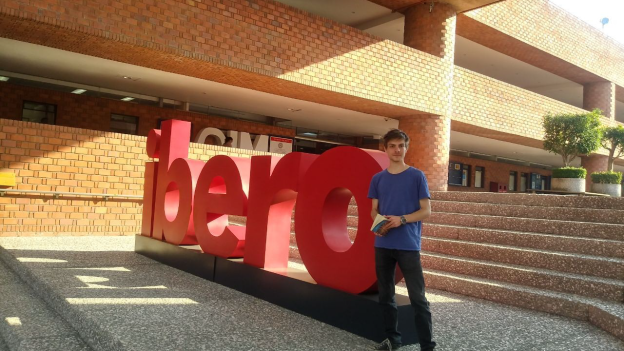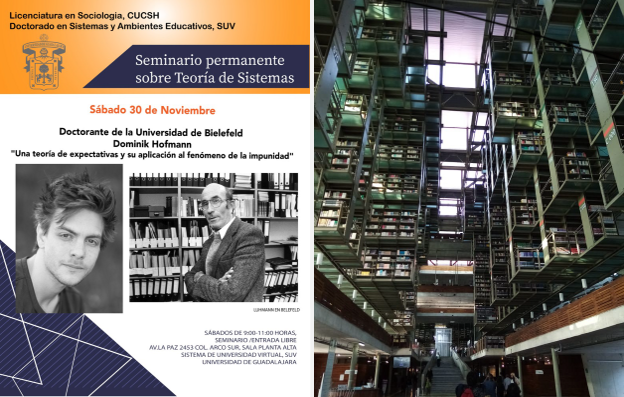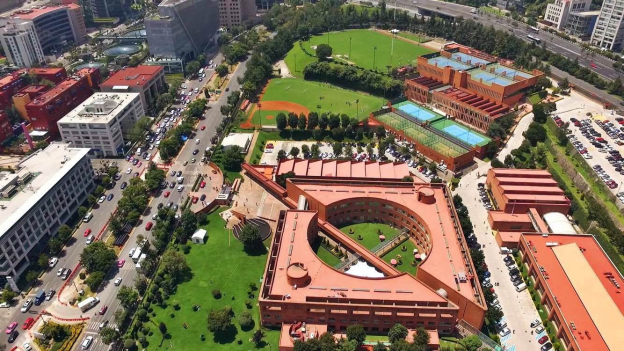Dominik Hofmann
 Privat
Privat
Dominik Hofmann on campus of the Universidad Iberoamericana
"Thanks to many encounters, I gained innumerable and priceless insights even beyond the realm of a doctorate. I am deeply grateful to the DAAD-Stiftung for making this experience possible. "
Dominik Hofmann's research concerned itself with the discourse of impunity. In 2019, as a postgraduate student at the Univesity of Bielefeld, he received the Gustav Schübeck-Scholarship of the DAAD-Stiftung which allowed him to further advance his studies by going to Mexico.
He shares his diverse experiences in a detailed report, a shortened version of which follows below:
Let me begin my report, which is really more of a story, with my first day at Universidad Iberoamericana in Mexico, which I will call simply “the Ibero” in the remainder of the text. I had gotten lost, and, in order to get to the university campus, I had to cross two four-lane roads and an overpass, which turned out to be a walk of nearly an hour. Fortunately, I had planned one and a half hours for just such contingencies, because I knew that my chances of not only getting on the correct minibus, but also getting off in the right place, were very slim. Traffic is one of the main topics of all conversations I had in Mexico City. Since the weather here never changes, the time it takes to get from A to B serves as a common and innocuous topic for small talk (an equivalent to talking about what one has eaten – the common topic in less urban regions of Mexico).
For a while I considered getting a bicycle, but I always discarded the idea, among other reasons because I did not want to expose myself to pollutants and breath them in. So I kept taking buses, which emit the very pollutants I aimed to avoid. Traffic breeds the necessity for more traffic.
In the shadow of an impressive building ruin at the entrance gate to the university, I was met by Professor Javier Torres Nafarrate, who had invited me to come to Mexico. All entrances to the campus are heavily guarded; access without a chip card is not possible. The Ibero is a private university, founded and financed by the Jesuit order. Though committed to the order’s ideals in general, it is independent in terms of its teaching. Within a highly stratified system of higher education, it is considered an elite university. At the library, I found – as predicted by research I did before my trip – a wealth of books (naturally mostly in Spanish), to which I had no access in Germany. Unfortunately, the computer at the workstation provided to me in Professor Torres’ office was impossibly slow, so I always worked on my laptop.
My “privileged status” there was more structural than situational: it did not directly benefit me in any way. But this was not the case in the academic context of my stay: Not only did I, as is common in academic work, use the contact networks of my professors, but beyond that I am fairly certain that the mention of my home country of Germany in general and my home university in particular helped me with requests I made for interviews and meetings with academics, journalists, lawyers and human rights activists that I needed for my dissertation. I believe I was given appointments that probably would not have been granted to Mexican students at a public provincial university. Despite this, I decided to mention my origins, as the main purpose of my trip was, after all, to conduct these interviews and discussions.

Privat
Also, my research project deals with a topic that is widespread in Mexico, but hardly exists in my home country. It deals with “impunity discourse”, meaning the social discussion of the fact that in many regions of the world, the large majority of all crimes goes unpunished. I am mainly interested in the forms in which these discussions occur, as well as the social reactions to such discourse. I went to Latin America because, here, impunity discourse (and I mean explicitly the discourse, not necessarily the phenomenon it refers to) is the most pronounced of all regions worldwide.
This was evidenced by the conference at the Colegio de México, which can be considered the peak of Mexico’s academic hierarchy. The opportunity to introduce my research project at that conference was one of the absolute highlights of my visit. On that occasion, I also encountered the institutional library for the first time, whose phenomenal inventory includes practically all of the literature I had previously searched for in vain at German libraries and those of the Ibero. This includes, in particular, the digital library, which can be accessed from anywhere on campus, which is why from then on, I was often drawn to the Colmex to work.
On a personal level, I tried to lead a “Mexican life” – whatever that may be – which was certainly aided by my good Spanish skills, refined by several long-term visits to Spanish-speaking countries. These skills are likely the reason why I was asked by the Ibero to do some translation work for a journal. During my half-year visit, I frequently translated brief articles and, in the end, made arrangements for further cooperation in this area in the future. One of the ways in which I attempted to integrate into everyday life in Mexico was by living in a house with Mexicans.

Privat
Of course, I could go on about my time in Mexico, but I’ll provide a short summary instead. First, I must briefly mention one point. The only reason I haven’t yet addressed this explicitly is because it has long become a matter of course for me. But, in view of the topics I’ve talked about in this report, I want to be certain to avoid any misunderstandings.
So, I want to express how much I learned to love Mexico even during my previous visit. I had already worked with a human rights organisation in the south of the country for an entire year. I was met with attentive, even loving kindness, I formed friendships and sparked initiatives for future cooperation – all to a degree I could never have expected. I was also entirely satisfied with the support offered by and contact with the DAAD-Stiftung; I felt perfectly taken care of.
At the time of my application for the scholarship I had three basic subject-specific objectives for my stay: To present and discuss my dissertation project in the socio-cultural and geographical context to which its content relates to a large degree; to conduct expert interviews and collect material for a discourse analysis; and to generate academic exchange at a general level. My hopes were fulfilled or exceeded on all three counts.
I am honestly convinced that my work advanced significantly during the half year of my stay, not only academically, but personally as well. Thanks to many encounters, I gained innumerable and priceless insights even beyond the realm of a doctorate. I am deeply grateful to the DAAD-Stiftung for making this experience possible.
As of spring 2020. The German Version is the original.


